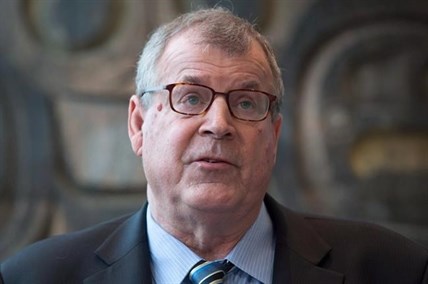
Steve Thomson, B.C. Minister of Forests, Lands and Natural Resource Operations, speaks during an announcement regarding protecting British Columbia's Great Bear Rainforest, at the Museum of Anthropology in Vancouver, B.C., on Monday February 1, 2016. A former Liberal cabinet minister is British Columbia's new Speaker of the legislature in what is likely to be a short-term appointment.
Image Credit: THE CANADIAN PRESS/Darryl Dyck
June 22, 2017 - 9:00 PM
VICTORIA - A throne speech outlining what could be the final goals of Premier Christy Clark's government includes a promise to hold a referendum on electoral reform.
The speech, read Thursday by Lt.-Gov. Judith Guichon, includes a number of planks from the NDP and Green party platforms in last month's provincial election as Clark's Liberals face a confidence vote in the coming days that could see their defeat after 16 years in office.
The election gave B.C. its first minority government in 65 years, with the Liberals winning 43 seats, the NDP 41 and the Greens three in the 87-seat legislature.
The speech says the Liberals would eliminate tolls on the Port Mann and Golden Ears bridges in Metro Vancouver, cut the provincial sales tax to offset an annual increase of $5 a tonne in the carbon tax and establish a royal commission on education.
It says a higher than forecast budget surplus allows the government to pursue innovative options, although the size of the surplus won't be released until next month.
The speech also includes recently announced government plans to raise monthly welfare rates by $100, spend $1 billion on early childhood education, and ban union and corporate donations to political parties.
The government's agenda seeks a balance between economic, social and environmental issues, the speech says.
"British Columbians voted for parties that spoke to the importance of economic growth and jobs, strengthening our social programs, and protecting our environment," it says. "They have told us to find a better balance to move forward on all these priorities."
The province has held two previous referendums on electoral reform, but neither changed the system when they were held in 2005 and 2009.
Earlier, a former Liberal cabinet minister was acclaimed Speaker in what might be a short-term appointment.
Steve Thomson, a former minister of forests, lands and natural resource operations who represents Kelowna Mission, said he is not looking beyond his duties in the event of the Liberal government's defeat and it would be up to a new government to appoint a Speaker.
But he didn't say from which party the Speaker should be chosen.
"If the government changes, it's the government that identifies a Speaker," he told a news conference. "Again, I'm not going to speculate as to how things will unfold. My job will be to manage the house ... to the best of my ability."
The position is a key one in this legislature because of the close election outcome and the prospect of tied votes that the Speaker would have to break.
NDP Leader John Horgan and Green Leader Andrew Weaver described Thomson as a person of integrity, adding if he were to extend his duties should the NDP form a minority government that would be welcome.
"Steve Thomson is a quality guy, a man of the highest integrity," said Horgan. "I'm not convinced he doesn't take this responsibility very seriously, and not as a week-long adventure but a commitment to the entire parliament."
News from © The Canadian Press, 2017